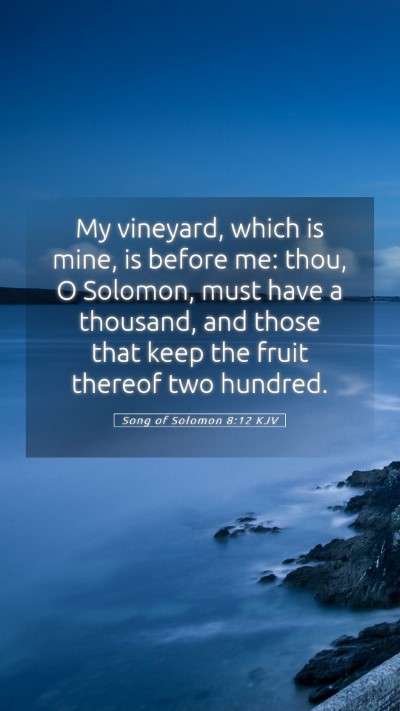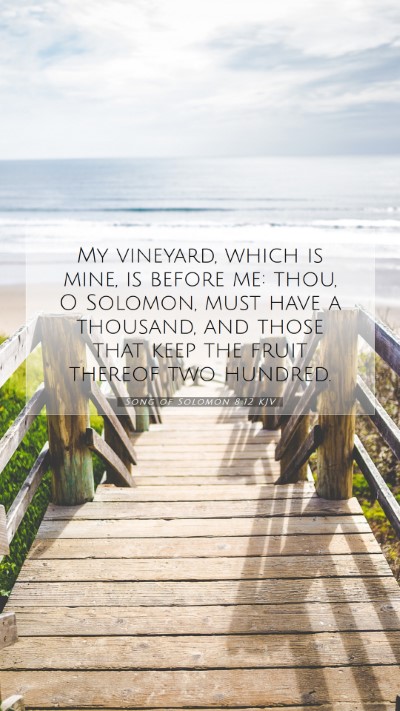Old Testament
Genesis Exodus Leviticus Numbers Deuteronomy Joshua Judges Ruth 1 Samuel 2 Samuel 1 Kings 2 Kings 1 Chronicles 2 Chronicles Ezra Nehemiah Esther Job Psalms Proverbs Ecclesiastes Song of Solomon Isaiah Jeremiah Lamentations Ezekiel Daniel Hosea Joel Amos Obadiah Jonah Micah Nahum Habakkuk Zephaniah Haggai Zechariah MalachiSong of Solomon 8:12 Meaning
What is the meaning of Song of Solomon 8:12?
My vineyard, which is mine, is before me: thou, O Solomon, must have a thousand, and those that keep the fruit thereof two hundred.
Song of Solomon 8:12 Bible Verse Meaning
Understanding Song of Solomon 8:12
Bible Verse: Song of Solomon 8:12 - "My vineyard, which is mine, is before me: thou, O Solomon, must have a thousand, and those that keep the fruit thereof two hundred."
Introduction
The Song of Solomon, or Song of Songs, is a book attributed to Solomon that captures the beauty of love and desire. In this chapter, the text reveals the intimate relationship between the two lovers, showcasing themes of love, possession, and the richness of human emotion. This analysis provides Bible verse meanings, interpretations, and insights to deepen understanding for those seeking Bible verse explanations.
Verse Analysis
In Song of Solomon 8:12, the speaker asserts the ownership of her vineyard, which symbolizes her love and desires. The phrase "which is mine" represents a claim of personal belonging, emphasizing the value placed on love and intimacy. The mention of Solomon, often interpreted as a symbol of wealth and power, suggests a contrast between personal affection and material abundance.
Insights from Commentaries
- Matthew Henry: This prominent commentator emphasizes the metaphor of the vineyard as the beloved, illustrating the depth of relationship and the tenderness of love. Henry notes that the "vineyard" represents something precious that the speaker desires to cultivate and protect.
- Albert Barnes: Barnes highlights the social and cultural dynamics at play, wherein the acknowledgment of wealth surrounding Solomon serves to contrast the personal dimensions of love. He notes that while many seek material wealth, the true value lies in the intimate, personal connection represented by the vineyard.
- Adam Clarke: Clarke interprets the vineyard in a spiritual light, suggesting that it can represent the Church, where believers are nurtured and cared for. He points out the responsibilities that accompany ownership, urging readers to think about the stewardship of love and relationships.
Thematic Elements
This verse reflects critical themes of:
- Possession: The ownership of the vineyard highlights the love's exclusivity and the desire for unity.
- Wealth vs. Love: Solomon's association with riches reminds readers that love transcends material wealth, focusing on deeper connections.
- Responsibility: The mention of tending vines relates to the nurturing and care required in relationships.
Related Cross References
- Isaiah 5:1-7: The vineyard metaphor is prevalent here, illustrating God's relationship with Israel.
- Matthew 21:33-44: The parable of the wicked tenants also covers themes of vineyard ownership.
- John 15:1-8: Jesus refers to Himself as the true vine, expanding on the symbolism of nurturing and fruitful relationships.
Application of the Verse
For believers, this verse invites reflection on the nature of love in their lives. It emphasizes the importance of understanding one's personal relationships, cultivating them with care and love, just like one would tend to a vineyard that produces fruit. The spiritual implication encourages individuals to consider the stewardship of their emotions and relationships, as well as the balance between spiritual richness and worldly desires.
In Conclusion
Song of Solomon 8:12 is a rich verse that encapsulates the sanctity and beauty of love while referencing the contrasts and commitments that come along with it. Engaging with this text through Bible study insights and commentaries like those of Matthew Henry, Albert Barnes, and Adam Clarke provides a deeper understanding of its significance. As one studies the meaning of Bible verses, they gain valuable perspectives on how to navigate personal relationships and the broader spiritual journey.


